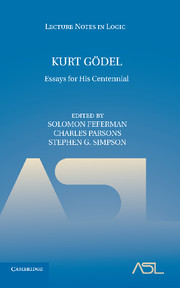Book contents
- Frontmatter
- Contents
- Introduction
- GENERAL
- PROOF THEORY
- SET THEORY
- PHILOSOPHY OF MATHEMATICS
- What did Gödel believe and when did he believe it?
- On Gödel's way in: The influence of Rudolf Carnap
- Gödel and Carnap
- On the philosophical development of Kurt Gödel
- Platonism and mathematical intuition in Kurt Gödel's thought
On Gödel's way in: The influence of Rudolf Carnap
Published online by Cambridge University Press: 04 August 2010
- Frontmatter
- Contents
- Introduction
- GENERAL
- PROOF THEORY
- SET THEORY
- PHILOSOPHY OF MATHEMATICS
- What did Gödel believe and when did he believe it?
- On Gödel's way in: The influence of Rudolf Carnap
- Gödel and Carnap
- On the philosophical development of Kurt Gödel
- Platonism and mathematical intuition in Kurt Gödel's thought
Summary
The philosopher Rudolf Carnap (1891–1970), although not himself an originator of mathematical advances in logic, was much involved in the development of the subject. He was the most important and deepest philosopher of the Vienna Circle of logical positivists, or, to use the label Carnap later preferred, logical empiricists. It was Carnap who gave the most fully developed and sophisticated form to the linguistic doctrine of logical and mathematical truth: the view that the truths of mathematics and logic do not describe some Platonistic realm, but rather are artifacts of the way we establish a language in which to speak of the factual, empirical world, fallouts of the representational capacity of language. (This view has its roots in Wittgenstein's Tractatus, but Wittgenstein's remarks on mathematics beyond first-order logic are notoriously sparse and cryptic.) Carnap was also the thinker who, after Russell, most emphasized the importance of modern logic, and the distinctive advances it enables in the foundations of mathematics, to contemporary philosophy. It was through Carnap's urgings, abetted by Hans Hahn, once Carnap arrived in Vienna as Privatdozent in philosophy in 1926, that the Vienna Circle began to take logic seriously and that positivist philosophy began to grapple with the question of how an account of mathematics compatible with empiricism can be given (see Goldfarb 1996).
A particular facet of Carnap's influence is not widely appreciated: it was Carnap who introduced Kurt Gödel to logic, in the serious sense.
- Type
- Chapter
- Information
- Kurt GödelEssays for his Centennial, pp. 242 - 251Publisher: Cambridge University PressPrint publication year: 2010



